- Home
- Sarah Hawkswood
Wolf at the Door Page 7
Wolf at the Door Read online
Page 7
‘Unless he is the werwulf,’ Golde reminded him.
‘Hmm.’ Agar was not of the werwulf-believing sort.
‘Mistress, how did Durand manage with the lad, William, when your sister died?’ Catchpoll hoped this line of questioning might discover some deep antipathy between father and son.
‘Took him about with him everywhere, he did, for his years before tithing age, but as lad became man and his voice broke, it seemed as if all the words that came to him were complaint. Once he had seen Alcester, with its taverns and whores, the forest lost its appeal to him.’ Winefrid made Alcester sound a pit of sinfulness, which was not how Catchpoll had viewed it, last time he had cause to pass through. ‘He would disappear, and turn up weeks later with some excuse upon his lying lips, and there would be shouting from the house nigh on loud enough to hear every word, but each time Durand would give him another chance. Whenever William was penniless, or had some man after his blood, he would run back here, pretending all would change, but it never did.’
‘And when was he last here, other than the day he found the body?’ Catchpoll felt his instinct was being supported.
‘I can tell you that, for it was Michaelmas. Easy to remember, not least because I saw them walk out of the village together, westward towards Wich, and I ain’t seen the pair as happy together since the old king were alive,’ Agar declared.
‘And did you see Durand after that?’ Bradecote asked.
‘No, my lord, but then of late he could be away some weeks before his hearth fire was lit again.’
‘And was Durand upon his pony, or leading it?’
‘Pony? No, my lord.’
‘Then he must have returned, or it would have starved in the stable.’
‘No, no, my lord. The pony was left to itself in the fallow field, along of Wystan’s ass, with the sheep and goats till they was moved onto the stubble to put the good back into the earth after harvest, and then Durand rode it away, just before Michaelmas. He must have ridden it back the night he died.’
‘Or it was brought back with Durand’s corpse slung over it,’ Catchpoll remarked, when they had left the family to their tasks. ‘I doesn’t care if father and son left Feckenham arm in arm and laughing, because there was plenty of time to fall out afterwards.’
‘But why did William Swicol say he had fallen out with his father, and come to make up with him? Why admit to a falling-out if there really was one?’ Walkelin’s mental filing system was good with details.
‘Well, like as not it sounded good at the time. After all, playing the prodigal son is not uncommon, and William Swicol would know that claiming he and his father were inseparable would be so great a lie it would be laughed at. Also, if you looks contrite for a small sin that is admitted, there’s some who will not see the great sin right before them.’ Catchpoll’s tone indicated he was not of that number.
‘I deny none of that, Catchpoll, but before you send back to Worcester to make sure there is fresh-made rope to hang the son for the murder of the father, I want to have an interesting evening at the hearth of the slow-dying Cedric, and you have to give me a reasonable explanation of the “wolf” in this, because someone other than William Swicol is involved and must have the animal.’
‘And where else did Durand keep his pony when it was not in Feckenham?’ Walkelin added.
‘Mayhap he just hobbled it in clearings as he went about the forest.’ Catchpoll sounded more annoyed than certain.
‘In the weather we have had since St Luke’s?’ Walkelin sounded very unconvinced. ‘No sane man would have spent these last weeks without shelter, unless he wanted his beallucas to shrivel, and cough unto death.’
‘You want to shave your pate and become an infirmarer in the priory, do you?’ Catchpoll snapped, hunching a shoulder and looking grim.
‘Walkelin has a point, Catchpoll,’ acknowledged Bradecote. ‘It does not mean you are wrong, but it needs looking into as part of undoing this knot.’
‘Hmm.’
‘Come. Only God knows all, Catchpoll.’
‘Aye, but it would be mightily helpful if He would be generous and let me – us – see more.’
‘That I do not deny. However, in the absence of Divine Guidance we must trust to ourselves. Now, before we gather our hearthside information, I think we should ask as many Feckenham folk when they last saw Durand Wuduweard or his son. Asking whether they know anyone who was at odds with him would give us the name of every villager down to babes at the breast. As well to ask also if any had dealings with William Swicol. If he cheats in Worcester, I would think he has cheated here, and perhaps someone is in debt to him. Proving he is not a man to cross might account for the body being here.’
‘Only if the debtor also knows of ill feeling between father and son, my lord,’ Catchpoll set his annoyance aside, ‘and also knew of a wolf or hound. That is what has been gnawing at me, just like a dog with a bone. Whoever killed Durand made it very clear to everyone he was dead, but at the same time did it in a way that gave no idea as to who the killer might be, which would be needed if a threat and warning. That also means it was planned, not an act of sudden wrath.’
‘Then the fact that he was dead was the important part, Serjeant.’ Walkelin was frowning in concentration. ‘What if the death was not a warning but a proof of relief?’
‘Go on, Walkelin.’ The serjeanting apprentice had Bradecote’s attention.
‘Winefrid told us how he was with his wife. So what if he treated another woman in Feckenham as badly?’
‘Would it not be all over the village?’
‘Perhaps not, if it was something forced upon the woman and kept hidden until now. Why should it not be, my lord, that someone has found out and decided to end it, and prove to the woman she is free?’
‘All well and good, lad, but it does not work with the wolf.’ Catchpoll did not wait for Bradecote to respond. ‘The bastard would have been found dead, but more like in the open, and just outside the village, where it might possibly be claimed he was killed by outlaws, and beaten or stabbed. If a Feckenham man killed him, they would know he used the house rarely, and might be there a month or more before discovery.’
‘Then they would have “accidentally” done that themselves, Serjeant?’
‘Well, I think that true enough, since I think it was William Swicol, but if everyone here loathed the man, why would anyone say they had an excuse to enter his house? No. It does not quite work, Young Walkelin.’
‘So what you are saying, in the end, is that us talking to anyone here, including reeve and priest and lodge-master, is not going to give us any answers we need.’ Bradecote rubbed his nose. ‘Since we agree that what you found when you saw the body means that Durand was not attacked at his hearthside, but his body brought there, the reason just has to be a connection to Feckenham, and yet it seems impossible that anyone in Feckenham could be connected to the wolf. Oh well. I think we still use the rest of daylight to knock upon doors, and if all we get from our being here is a night’s rest, we at least start fresh tomorrow. Then we head northward on the Ridge Way to the northern wuduweard at Tutnall, and keep our eyes open for any sign of the missing man of Alcester. Let us hope the lord Sheriff has not had a day with as little to show for it.’
Crocc the Hunter did not have the nose of a hound, nor indeed the eyes of a hawk, but he had an instinct for the animals of the forest, and could tell almost by a broken twig, without any print of hoof or hair of hide, what inhabited an area. Within half an hour of his commencing to search the woods about Bradleigh, he had found signs of roebuck and red deer, and even the newer fallow deer that the kings since the Conquest had ordered to be set loose in their favoured hunting grounds. There were no boar, and certainly no sign of any predator larger than a fox. Yet the forest had something to it he could not place, a nervousness as if the beasts too had heard of a wolf and were fearful in anticipation. Of course, a wolf howl would carry well if the wind was right, and so a wolf might just have
passed within a few miles. His bow felt comforting, even unslung. He gave himself a mental shake. He should listen to the forest but not believe its every whisper of gossip. Without droppings to give the lymer a scent to follow, there was little chance of finding a wolf by accident. Bearing in mind the lord Sheriff’s admonition that a successful hunt was one with meat for the table, he folded the droppings of a red deer in a wrapping of old leaves, and placed them in a scrip. When he met with William de Beauchamp at Bradleigh he was confident that his lord would not find fault with him. In this he was quite correct. What he also said to the lord Sheriff, about the feeling of the forest, was said very quietly, and de Beauchamp made no response.
The lymer was a soulful-looking animal that had given the impression of having been brought to this spot upon sufferance, right up to the point where it was presented with the contents of the leaves. The dog was suddenly all eagerness, hauling its handler behind it at the end of the length of rope that attached them together, and, nose down, set off at a determined trot, with the hounds and de Beauchamp and his entourage in its wake.
The day was too overcast for there to be a noticeable sunset, but the light was definitely fading fast when William de Beauchamp rode into the manor at Bradleigh on a loose rein, and with his hunting party behind him. His nose and cheeks were so cold that they ached, and if Hubert de Bradleigh did not provide meat and hot wine he would regret it, but overall de Beauchamp was pleased. He had hunted, and had brought down a fine stag with a spear, whilst an archer had taken a roebuck, so he might even send a shoulder of the roebuck to the prior of St Mary’s as a gift. That ought to assure him being in the prior’s prayers. He would not leave any part of the carcasses with the lord Hubert. No, there would be no reward for calling for a hunt of a wolf that was not there.
Hubert de Bradleigh did not spend a pleasurable evening entertaining the lord Sheriff of Worcestershire, being very well aware he did not stand in the lord’s good grace, and feeding far more mouths than he had anticipated when he had risen that morning. There was no wolf howl to add to his woes. There was a reason for this.
The wolf howled close to Feckenham as full darkness fell, and it was heard beside every hearth, just as the man who encouraged it to give voice intended.
Chapter Six
Catchpoll had just been telling the maid Golde that wolves kept far away from people, as she ladled pottage from the cooking pot hung over the fire. At the sound of the howl she squealed and dropped the ladle into the thick liquid, splashing it up onto her hand and dropping the wooden bowl she had been about to fill. The squeal of fear became a cry of pain. Father Hildebert crossed himself and clasped his hands together in prayer. Catchpoll got up with a sigh and went to the door.
‘What are you doing?’ Father Hildebert cried.
‘Well, the beast is not slavering on the other side, Father. I wants to listen, and listen well. Some big hounds howl like a wolf, and to be honest, how many of us have heard a real wolf howl? We just knows what sort of noise it is.’ He opened the door wide and stepped into the dark.
Walkelin, though he did not later admit it to his superiors, gave a start when he heard the howl, but he persuaded himself that in part it was because the reeve jumped up as if jabbed with a pitchfork in the buttocks. He was not as sanguine as Serjeant Catchpoll, but tried to sound reassuring, and at the second howl went to the reeve’s door and opened it, but not fully, and stood in the doorway.
Hugh Bradecote, upon the excuse of nature’s call, was not in Master Cedric’s hall, but quietly nosing about the hunting lodge kennels, set on the opposite side of the gate to the steward’s hall, to see if there had been any animals within in recent time. It did not smell of anything canine, though he disturbed a rat’s nest in one corner, and he was returning across the courtyard when he heard a long, drawn-out howl. He stopped dead, but then went to the wicket gate and lifted the latch. When he had been a squireling, his lord had been very keen on hunting, and had a fair number of dogs, and sometimes there had been a howling. It was a slightly eerie sound, even when you knew it was not a wolf. He listened now, trying to match what he heard with his memory. It was very like it, and yet was it the same?
He saw a figure outside the priest’s house. That had to be Catchpoll, and he walked towards him. Catchpoll raised a hand and they met where the lane led off towards the mill.
‘So, is that a wolf, to your ears, Catchpoll?’
‘I don’t rightly know, my lord, never having heard a wolf for sure. It sounds the way I would think a wolf would sound but …’ He shrugged in the darkness. ‘It don’t sound close, though, not close enough to be a threat here.’
‘No, I agree, but perfect to ensure everyone trembles in their beds. The thing is, though, the nights are long and dark and cold, and folk would not be outside in the evenings. There would be no reason to want to make them stay indoors when they stay there anyway.’ Bradecote blew on chilled fingers. ‘There have been neither dogs nor wolves in the lodge kennels, I can say for certain. We shall still be leaving a village of headless fowl in the morning, but there is nothing more we can do. Goodnight, Catchpoll.’
‘Goodnight, my lord.’
Master Cedric stared into the fire, as if willing it to give him more heat. He had heard the howling, but it did not concern him. When Bradecote returned and made much of having gone out to listen more closely, he merely nodded an understanding.
Osric entered, and asked his master if he was ready to eat. Upon the assent, he came to assist the ailing man to stand, and let him lean upon him to the seat and table at the end of the chamber, although there was no dais. Bradecote did not think Osric looked strong enough to be a support to anyone, and followed to sit at the end of the table furthest from the solar door. Osric fussed with the fur-trimmed cloak about his master’s shoulders, and then went to bring the meal. There was bread and thick pottage that had caught at the bottom of the pot and gave the whole a vague burnt taste, though Bradecote noted that the dollop that Cedric was given had no obvious dark parts whereas his own did. He felt slightly resentful that the man stirred it round his bowl more than ate it. Osric then brought mulled wine, and a small beaker that Cedric emptied swiftly, with an expression of distaste, before sipping his wine.
Bradecote wondered why a dying man had even bothered to conceal the depth of his loathing of Durand Wuduweard, and so did not skirt around the issue.
‘Tell me, Master Cedric, what it was that caused you and Durand Wuduweard to be so out of charity that he rejoiced at your ill health?’
‘Nothing of my beginning. He was ever jealous that I held custodianship of this place, and felt that as keeper of the forest he ought to also be keeper of the King’s lodge. I have heard of no other with such a claim. When King Stephen came here in ’38 he was swift to appear. He said it was upon forest business, but it was not. He defamed me, in Foreign, to make himself seem the worthier and me the lesser man of poor repute.’
‘If he spoke in Foreign,’ and Bradecote did not sound offended at the term, ‘how do you know that he defamed you?’
‘Because his Foreign was weaker than he thought, and he made his case poorly. Afterwards one of the knights of the Earl Waleran asked me what lay between us that he would claim such wrongdoing on my part. He told me what Durand had said, the falsehoods he had spoken.’
‘And that was?’ Bradecote did not sound too interested.
‘That he, as a man of Norman descent, was worthy of the position, and that I had been putting in claims to the King’s exchequer for repairs that were not needed or made. He said I was corrupt.’
‘To gain the position?’
‘Yes, and because he was jealous.’ Cedric sighed.
‘Of you being steward of this hunting lodge.’
‘Oh yes, but most of all, because of my wife. He could not have her, but then God decreed that nor should I.’ Tears began to fall down Cedric’s cheeks.
‘Lord, you should seek your bed. Come, let me help you. The lord Bradeco
te will forgive your retiring.’ Osric, who had stood back in the shadows but been always close to his master’s elbow, stepped forward and laid a hand upon it.
‘Yes, it would be wise. The poppy juice unmans me, for which I am sorry, my lord Bradecote.’ Cedric rose slowly and leaned heavily upon his servant. ‘Goodnight, my lord. I hope you will sleep well enough by the hearth.’
‘I shall indeed, Master Cedric.’
Bradecote rose also, out of courtesy, and watched the man make his way, slowly, to the solar door. Then he went to get his blanket roll.
In the solar, Osric tenderly helped his master to bed. The sick man thanked him and then asked, ‘He did not find it?’
‘No, lord, for he looked in the old kennels only. He did not find it. It is safe and secret still.’
‘That is well.’ Cedric sighed. ‘Thank you.’
It was debatable who slept the soundest of the shrieval trio, not that any of the three mentioned it when they met at the church the next morning. Father Hildebert was making ready for the burial of Durand Wuduweard, now that Leofric the byrgend had successfully reached the full depth of a grave. He was worried that Durand’s son would not be present at his father’s obsequies, and was thus both surprised but also pleased when the church door creaked open and William Swicol stepped into the cool gloom. The man looked outwardly sombre, but Catchpoll knew him too well to be fooled. Catchpoll felt that beneath the lowered lids and downturned mouth, there was something jubilant about him. Father Hildebert greeted him with raised hands and ‘God be praised’, and then asked the question that sprang to the minds of the sheriff’s men.

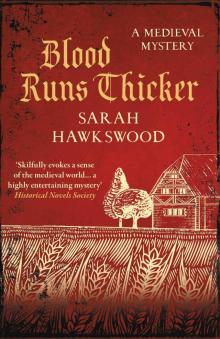 Blood Runs Thicker
Blood Runs Thicker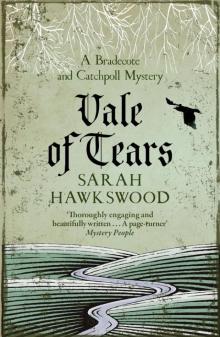 Vale of Tears
Vale of Tears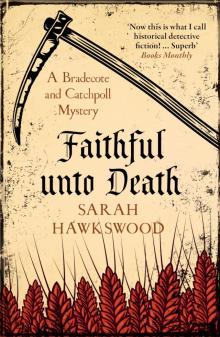 Faithful Unto Death
Faithful Unto Death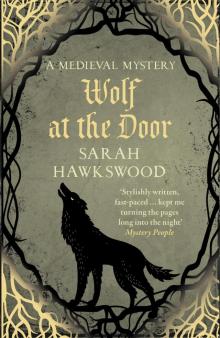 Wolf at the Door
Wolf at the Door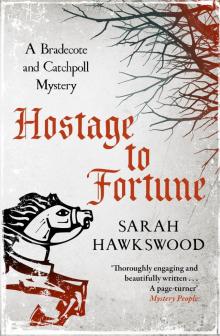 Hostage to Fortune
Hostage to Fortune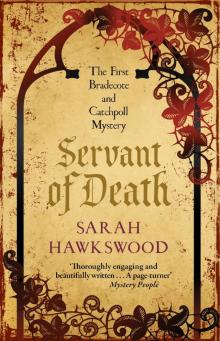 Servant of Death
Servant of Death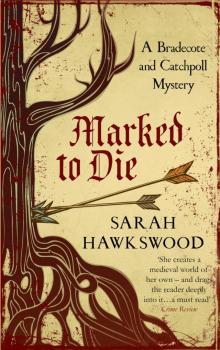 Marked to Die
Marked to Die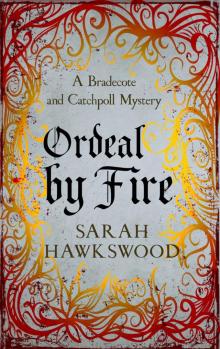 Ordeal by Fire
Ordeal by Fire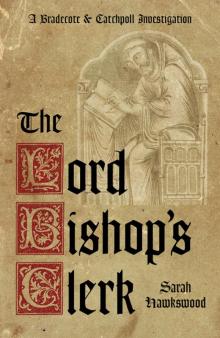 The Lord Bishop's Clerk
The Lord Bishop's Clerk